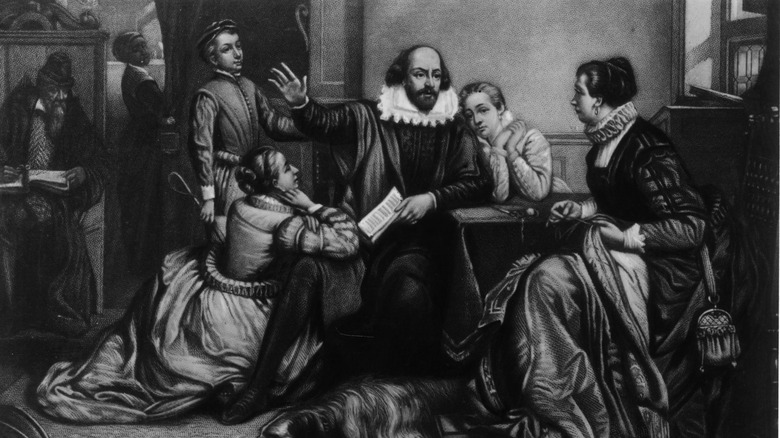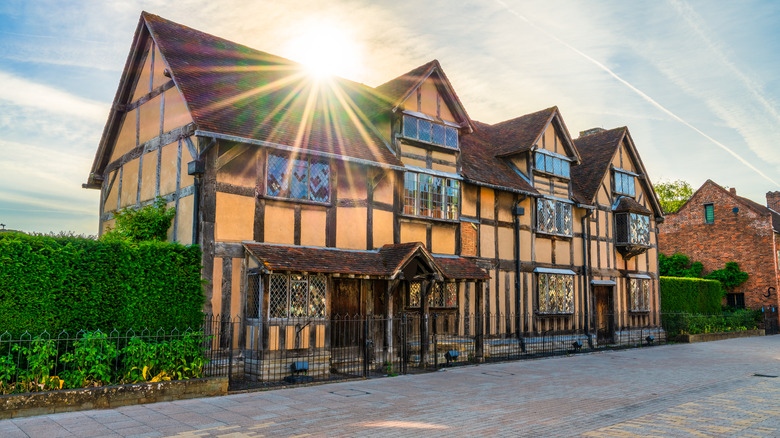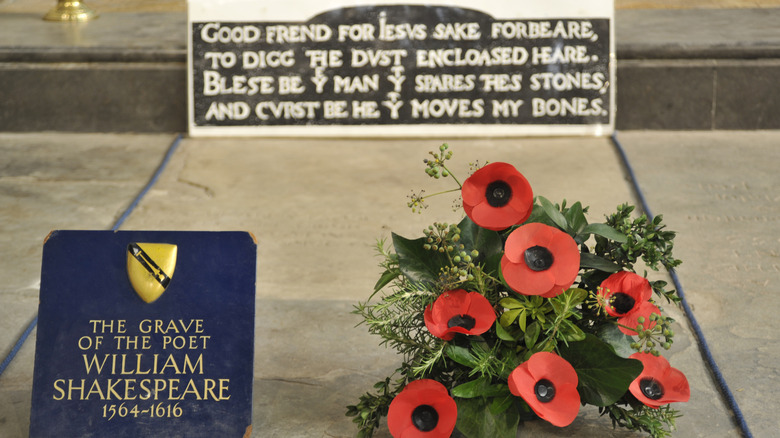William Shakespeare's Will Reveals A Lot About The Famous Writer
William Shakespeare died on April 23, 1616, which is also largely considered to be either on or close to his birthdate and is the date on which his birthday is typically recognized (via Folger Shakespeare Library). At the time of his death, Shakespeare was 52 years old. The exact cause of his death is unknown, but, due to his will being drafted a few months before his death, he could have been ill for a few months prior to his passing.
Per Britannica, at the time of his death, Shakespeare wasn't quite considered to be the famous playwright we know him as today. In fact, his burial, which took place at Holy Trinity Church in his birthplace of Stratford had the air of belonging to a wealthy man rather than a famous one. As may be expected of a man known for his words, Shakespeare's will contains plenty of them. The original document, which still survives to this day, reveals a lot about a man who, despite all of his works, is still very much a mystery.
The question of the second-best bed
One of the more well-known aspects of William Shakespeare's will is that he left his second-best bed to his wife Anne. Via the Shakespeare Birthplace Trust, Shakespeare's will read, "Item I gyve unto my wife my second best bed with the furniture." On the surface, this seems like a strange gift to bequeath someone you are married to. However, a little bit of context tells us that it may not have been intended as a slight. In the 16th and 17th centuries when Shakespeare was writing, a bed was considered to be a highly luxurious item and one to pass down.
In a household, the bed considered to be the best would not only have been given to guests but could even have been on display downstairs as a sign of wealth and status. Because of this, it seems probable that the "second best bed" given to Hathaway was the bed she shared with Shakespeare. Additionally, under medieval law, Anne would have been entitled to a third of Shakespeare's estate. Still, there is no other mention of Anne throughout Shakespeare's will, further fuelling speculation that the playwright wasn't too fond of his wife after all.
There are several odd requests in the playwright's will
Another intriguing thing about William Shakespeare's will is his gift to his sister Joan. As stated by Shakespeare Documented, Shakespeare left his clothing to his sister, an unusual bequest considering that his clothes would have been men's. This section has been interpreted as Shakespeare intending for Joan to sell the clothing or for her to give it to her husband William Hart. As well as clothes, Shakespeare left money to Joan and her three sons.
He additionally left a plate to his granddaughter Elizabeth Hall, the daughter of his first-born Susanna Hall, though she is referred to as his niece within the will. Shakespeare also gifted a silver gilt bowl to his daughter Judith — a pleasant, if random bequest.
Not just giving gifts to his family, Shakespeare bequeathed a sword to the nephew of one of his friends and left exactly 26 shillings and 8 pence each to Richard Burbage, John Heminges, and Henry Condell, all fellow members of The King's Men theatre company. He gave the same sum to Hamnet Sadler, William Reynolds, and Anthony and John Nash in order to buy mourning rings. As well as material possessions, William Shakespeare left the sum of 10 pounds to the poor who lived in Stratford.
Quite a few revisions were made following the first draft of the will
Although it is thought William Shakespeare first began to write his will in January of 1616, the document shows signs of being revised in March of the same year, according to Shakespeare Documented. This could be because his daughter Judith got married in February 1616 to Thomas Quiney, thus prompting Shakespeare to change what he left to her. The alterations included a line that provided for Judith "until her marriage" being crossed out completely.
Interestingly, a section was added that is assumed to have been Shakespeare's way of providing for Judith if she ended up as a widow following her marriage. However, the revisions may also be a nod to how Shakespeare felt about his daughter's husband. Just a month after Quiney married Judith, he was fined five shillings for fornication. Sadly, per the Shakespeare Birthplace Trust, the woman he was having an affair with and her baby died during childbirth.
Shakespeare's eldest daughter was given a lot of responsibility
In comparison to Judith Quiney, who was given money but not a substantial amount, William Shakespeare's eldest daughter Susanna Hall inherited quite a lot. Per The National Archives, Susanna and her husband John Hall were named executors of the will, meaning they essentially carried out all of the requests within it. This duty would normally fall to a son, of which Shakespeare had none living, though it could be considered unusual that he named both his eldest daughter and her husband executors instead of just her husband.
He also left Susanna the majority of his estate, which amounted to four residences and the land he owned in the surrounding area (via Shakespeare Oxford Fellowship). This bequest included the house Shakespeare currently lived in, which he referred to as "the Newe Place wherein I nowe dwell." These bequests and the fact she was named an executor of the will show that Shakespeare trusted Susanna's judgment and ability to handle his estate. They indicate he was quite close to his eldest daughter, too.
Some of the additions have been questioned
A discrepancy that has puzzled those who have studied William Shakespeare's will is the question of his signatures. As pointed out by Shakespeare Documented, each signature is slightly different. Over the years, this has led to speculation that some parts or even all of the will were forged. To counteract this, the difference in signatures could very well be due to illness. Illness can cause shaky hands, which in turn could cause the signatures to appear slightly off. Moreover, if Shakespeare was in bed when signing, the angle could also have caused him to write his signature a little strangely.
In addition to this, some pages and sections of the will appear to have been written with different ink, suggesting last-minute alterations (via Shakespeare Oxford Fellowship). Nevertheless, handwriting authorities have decreed that, while the inks are different, the handwriting suggests that the changes were added in by the same person. There's no doubt that Shakespeare's will is full of strange bequests and inconsistencies, but these could just be the result of Shakespeare's changing feelings or events like his daughter's marriage prompting him to change what was previously written.





